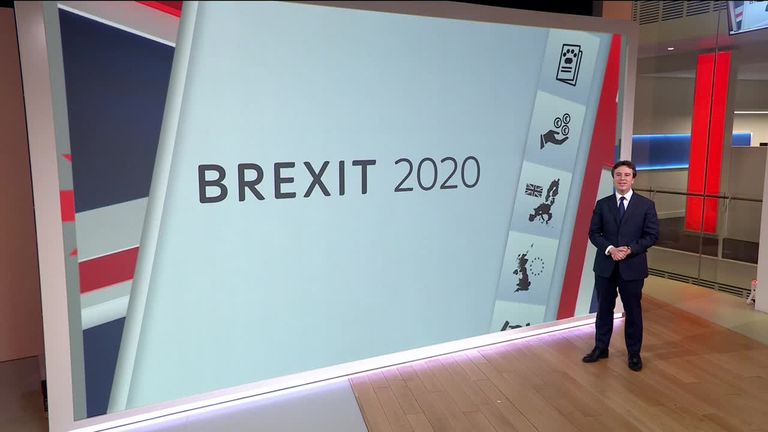Brexit trade talks: What are UK and EU's red lines?
From fisheries to criminal justice, Brussels and Westminster have different views over how the talks will go.
Thursday 27 February 2020 15:45, UK
The UK and the EU have both set out their red lines ahead of trade talks that start on Monday.
The UK has said it is prepared to walk away from the talks in June if not enough progress has been made, while Brussels has warned Britain faces a "tough road ahead".
There are several areas where the two sides are already at loggerheads.
Fishing
Brussels has demanded the UK continues to allow EU fishing fleets access to British waters ahead of a free trade agreement.
EU chief Brexit negotiator Michel Barnier said fishing rights must be included in the deal or there "won't be any agreement at all".
But the British government is putting its foot down, with prime minister Boris Johnson saying UK fishing territory should be "first and foremost" for British boats once the UK leaves the Common Fisheries Policy.
The government has also refused to link fishing waters access to access to EU markets.
Trade and a 'level playing field'
The EU has said that due to the proximity of the UK, a trade deal cannot resemble one struck between Canada and Brussels - the free trade model Mr Johnson wants.
Brussels said it wants to ensure there are no "unfair competitive advantages" between the two so a future trade deal should include "corresponding high standards over time" using the EU's rules "as a reference point".
It wants to keep the UK aligned to its regulations in areas including workers' rights, environmental standards and state subsidies.
However, the UK is adamant regulatory alignment is not required and said it will not agree to anything in which the UK does not have control of its laws.
Mr Johnson said: "We wouldn't ask the EU to follow every change in UK legislation, so it doesn't make any sense for them to make the same requirement of us, and that's where we are."
He said the UK will not be making any concessions.
European courts
Brussels wants European courts to be responsible for resolving legal questions arising from the interpretation of EU law.
It says any questions over the interpretation of EU law should be referred to the Court of Justice of the European Union for a binding ruling.
But, the UK says it will not agree to the court having any jurisdiction in the UK.
Financial services
The UK wants the deal to include "legally binding obligations on market access and fair competition" with regulatory co-operation agreements.
Both sides had committed to carrying out assessments to check whether their current regulatory systems are compatible by the end of June - although the EU's mandate did not mention the date.
Brussels said its assessment of UK rules could be changed at short notice - which could cause major problems for the City of London.
Criminal justice
The UK wants to pull out of the European Arrest Warrant agreement, but wants an accord on "fast-track extradition arrangements".
That poses an issue as some European countries, such as Germany, forbid the extradition of their nationals to non-EU countries.
The UK wants law enforcement to be part of a separate deal from the trade deal.
However, the EU wants one agreement covering everything.
Brussels has warned any co-operation must be based on the UK remaining signed up to the European Convention on Human Rights.
:: Listen to All Out Politics on , , ,
Cultural objects
The EU has demanded that both sides should "address issues relating to the return or restitution of unlawfully removed cultural objects to their countries of origin".
The Elgin Marbles, the Parthenon sculptures brought to Britain more than 200 years ago which Greece wants back, is believed to be the main issue there.
Downing Street has ruled out the marbles being part of the "discussion as part of our trade negotiations".







